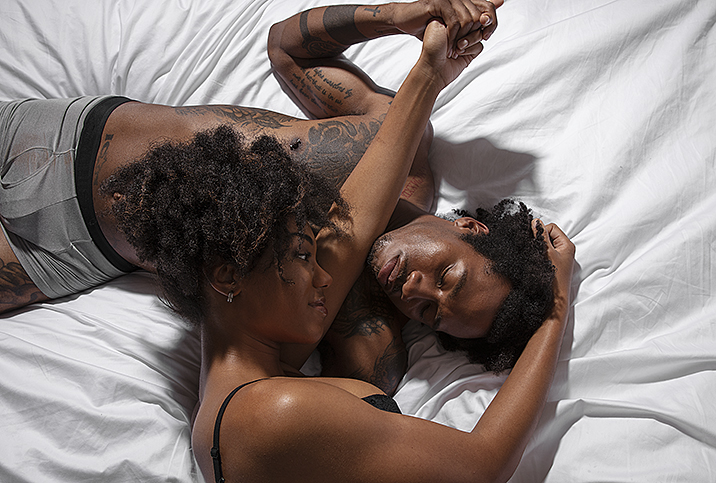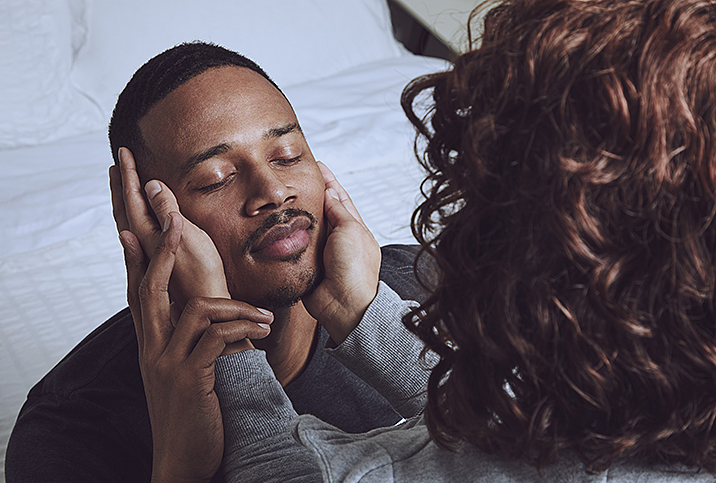Your Breath Is Your Superpower

"Breath is the one thing you're born with and the last thing that will be with you," said Erum Khan, a multidisciplinary psychotherapist and researcher who focuses on couples and sexuality in Karachi, Pakistan. Khan added she believes regulating our breath and being conscious of it allows us to tap into deeper recesses of our experiences.
"How can we not know how to use it?" Khan asked. "We could put in the practice and effort to understand it, and develop a relationship with it. And we don't. It can be used phenomenally in the sexual realm. Sex is not all about arousal, it is also being relaxed to absorb the experience."
One exercise she recommends for clients involves regulating the vagus nerve—responsible for the regulation of internal organ functions, such as digestion, heart rate and respiratory rate—and, in return, the whole nervous system.
"I usually tell them, a breath that regulates the nervous system is a much longer exhale, that calms the nervous system," Khan explained. "You inhale, but the exhale is much longer. When you try and take mindful breaths, the nervous system calms down enough to make sex more pleasurable. I'm talking specifically for people who experience pain and stress during sex."
We are all in tune with each other
Arantxa Joseph, a certified sexological bodyworker who practices what she calls embodied joy through somatic coaching, bodywork and dance, believes breath can also interact with the social nature of being human.
"From the perspective of the nervous system, when we engage with each other, we have a social engagement system, and by looking at each other, we co-regulate," she said. "Let's say I am in front of you as you're breathing, and you're looking tense, stressed out or scared. I will be breathing with you and I'm aware of that, so I can bring us both down to a level of safety. We affect each other. We tune in to each other to listen."
In practice, if you find yourself in an argument where one person finds their breath to be more rounded and heavy with emotion, the other can check in with their own breathing and make a choice to regulate it.
"It's easy to say, but it takes a lot of practice in the moment," Joseph said.
In Khan's words, sex is a universe made up of multiple constellations of experiences and states, and breathing is one way to embody these experiences. Pleasure is an experience of the senses and breath is a method for us to connect to those senses. During sex, Khan said, the sound of your own breath can be as pleasurable as listening to your partner. For her, sex and breathwork are both an art and a science.
"It's something my fine arts teacher once said to me: First learn the rules and then break them," Khan explained. "When you can regulate the cycle, there are times you can let go as well. There may be times when you want to prolong a certain experience or state, and a lot of us don't know we can actually do that. In instances where you catch yourself breathing really fast, you can ask yourself, 'What does my body want? What do I want?'"
Touching to explore
Joseph personally uses breathing to connect with parts of herself and her senses.
"First of all, isolate parts of your body as you are achieving a relaxed state. This movement and state of relaxing becomes a part of your movement and physical reportage and is going to be somatically held," Joseph said. "When you want to express yourself in a sexual encounter, your body will be able to access that reportage naturally."
Breathing could allow you to build a vocabulary of connection with others. Sensate focusing, an exercise Khan does with clients, can help reconnect couples with their bodies and each other.
"Sensate focus is a meditative sexual experience and it's especially good for people who are struggling with physical intimacy," she said. "It starts with the initial phase of non-genital touch and just breathing. We start with defining nonsexual touches where, at first, you're not supposed to touch the erogenous zones that your partner has identified. So this is touch just for the sake of exploring, getting to know your partner's body. While the other partner is receiving this experience of touch, we focus on them to connect to their breath and just kind of experience it.
"Breathing allows us to be conscious of connection and our body," Khan added. "By developing mastery of the experience itself, studying it and playing with it with your partner's knowledge can really help you ride the wave. It becomes a joint experience."
For Joseph, breathing is the first step to intimacy.
"I want to sit down and look into the person's eyes and I want to breathe from that place of connecting," Joseph said. "I know other things are going to happen. It's not like I'm thinking about what is going to happen but I'm looking at what is going to unfold. And then from there, I move into the present. I'm feeling new sensations and I'm not rushing into that space as I am calm. This is really being in the moment, the excitement and the pleasure. And if we do it slowly and breathe together, it has no end. In the journey of pleasure, it is all about the journey and having no destination."
It may become overwhelming to suddenly have to focus on your partner, on yourself and your breathing all at once. Practicing your breathing techniques on your own every day can help.
Connecting with pleasure
Breathing allows us to stay grounded. Khan noted many people get anxious or distracted during sex, an experience that can be remedied with careful attention to breathing.
"The body's natural physiological response—because of the strenuous activity and the sympathetic system being activated—is to flood our body with these neurochemicals and that can be incredible," Joseph continued. "You hear people talk about it as you're hanging on the cliff's edge."
This stage is particularly affected by breathing patterns. Khan thinks using the right breathing can even help men last longer, as they would be more conscious of their bodies and their peaks of pleasure.
"Working with my breath, I will connect with my body, to connect with the pleasure itself, with what's happening within as well," she said. "There are times when I stop myself, when my mind is going in many places when I am in the act itself, and I will pull myself back and breathe. I will connect with my body, and whatever part is being touched and stimulated. I'm still learning."
For instance, she has in the past noticed she was holding her breath or became tense, and then released her breath to calm down.
'Breathing allows us to be conscious of connection and our body.'
Breath allows us to focus, which, in return, lets us build up, contract and expand currents of energy in our bodies. For Joseph, this particularly means an interaction with sound. Taking a deep breath in and letting it out with a vocalization can change the experience.
"It really opens up the chest," Joseph explained. "The vibration really helps the body open up to pleasure. This vibrational sound penetrates the body, and the sound can enhance the body to flourish, to open up or to shut down. As you moan, your body relaxes and it will open room for full access to your body's experience for pleasure."
Another strategy to bring your body to a restorative place is to take a deep breath, continuing to inhale until your genitals are engaged. Then when the breath is let out, the pelvic bowl can relax and let your body feel safe and ready to engage your genitals for pleasure.
Joseph has even practiced short circular breaths to activate orgasmic potential. "It's like orgasm through breath," she said. "So you do this for a while. I'm going to connect to my body and my pelvic bowl. I'm going to bring sound in. You don't even have to take your clothes off."
Joseph believes the best sexual experience is about the sensations you are building together, and the erotic energy you're bringing together. It doesn't have to be skin touching skin.
Harnessing your superpower
You, too, can work intuitively with these breaths. Joseph said even a 10-minute breathing practice—especially for someone having intimacy issues—can do wonders. According to her, we all know this information innately, but forget to trust our bodies. She rediscovered that knowledge through dance, initially.
"I was practicing a very high-cardio West African dance," she explained. "We have the drumming, and we would be dancing for an hour and a half, full active cardio. When you come to that state where the body is warm and the breathing is regular and rhythmic, you are focusing on the breath. And then your breathing allows for effortless movement. You harness your levels of energy."
Joseph brings the same awareness to dance when teaching her students.
"When we're moving, we must pay attention to our breath and the sensations we're feeling after this sequence of movement," she said. "How are we breathing now? What are we feeling now? This awareness is very important to understand how to have control over our physical capacity, and to expand the sensations available to utilize a power, you must be aware of it. To harness a superpower, you must practice."




















